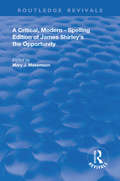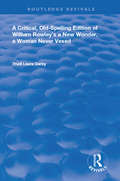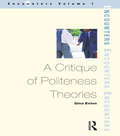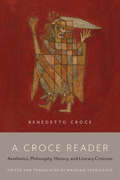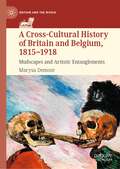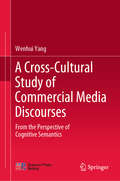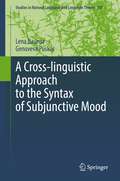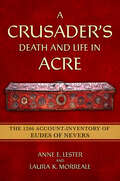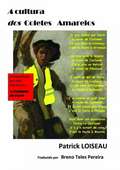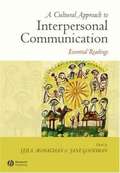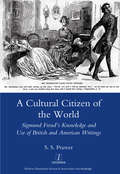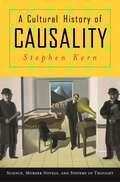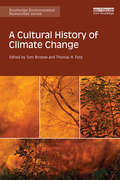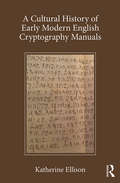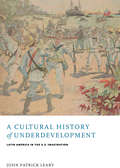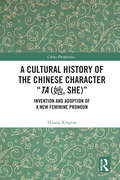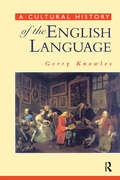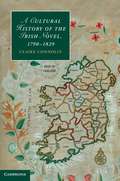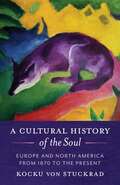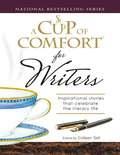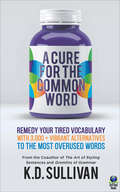- Table View
- List View
A Critical, Modern-Spelling Edition of James Shirley's The Opportunity (Routledge Revivals)
by Mary J. MekemsonOriginally published in 1994, this work offers a critical commentary on James Shirley's 1634 play, 'The Opportunity', including chapters on the critical reception, 'The Opportunity as a Social Comedy' and the history of the editions, including the 1640 quarto.
A Critical, Old-Spelling Edition of William Rowley's A New Wonder, A Woman Never Vexed (Routledge Revivals)
by Trudi Laura DarbyFirst published in 1988, this book offers a critical examination of William Rowley's 1632 play, A New Wonder, A Woman Never Vexed, including chapters on structure and technique, themes, critical history and staging.
A Critique of Politeness Theory: Volume 1
by Gino EelenAs a sociolinguistic phenomenon that connects language and its users to the social world that surrounds them, politeness can provide insights into the very structure of social reality and the process by which it is established and maintained. And through its focus on ethical aspects of social interaction, it can expose the fundamental nature and the inner workings of morality in our everyday lives. Although a highly specific subject matter, politeness therefore touches on issues far beyond its immediate borders. In a critical state-of-the-art review of the field, this book examines the extent to which the potential impact of politeness has been explored so far. Through a metatheoretical analysis of epistemological, methodological, social and psychological ideologies prevalent in mainstream politeness theory, it offers an overview of sociolinguistic thinking about language and social reality during the past quarter of a century. Eelen's analysis of the literature reveals a coherent and consistent ideology underlying the entire field, but also shows how this ideology has caused scientific theory to miss out on many important aspects of the reality of everyday life. His examination of the relationship between science and commonsense thinking, between scientific and everyday notions of politeness, draws attention to issues which remain untouched by current theoretical models and opens up avenues of research hitherto left unexplored.
A Croce Reader: Aesthetics, Philosophy, History, and Literary Criticism
by Massimo VerdicchioBenedetto Croce was a historian, humanist, political figure, and the foremost Italian philosopher of the early twentieth-century. A Croce Reader brings together the author’s most important works across the fields of aesthetics, philosophy, history, literary criticism, and the Baroque and presents the “other” Croce that has been erased by scholarly tradition, including by Croce himself. Massimo Verdicchio traces the progress of Croce as a thinker, focusing on his philosophy of absolute historicism and its aesthetic implications. Unlike other anthologies, A Croce Reader includes essays from the Aesthetics of 1902 and key studies on Vico, Hegel, and Pirandello. Verdicchio’s masterful translation of the source material welcomes specialists and non-specialists alike to discover the “other” Croce for themselves.
A Cross-Cultural History of Britain and Belgium, 1815–1918: Mudscapes and Artistic Entanglements (Britain and the World)
by Marysa DemoorThis book highlights the ways in which Britain and Belgium became culturally entangled as a result of their interaction in the period between the Napoleonic Wars and the First World War. In the course of the nineteenth century, the battlefields of Waterloo and Ypres in Belgium became veritable burial grounds for generations of dead British military, indirectly leading to the most intensive ties between the two countries. By exploring this twofold path, the author uncovers a series of cross-influences and creative similarities within the Belgo-British artistic community, and explores the background against which the British national identity was constructed. Revealing unknown links between some of the most famous artists on both sides of the channel, such as D.G. Rossetti and Jan Van Eyck; Christina Rossetti and Fernand Khnopff; John Millais and Pieter Breughel, and Lewis Carroll and Quentin Massys, the book emphasises an artistic cross-fertilisation that can be found within battlefield literature throughout the nineteenth century, including examples from the likes of William M. Thackeray, Frances Trollope and Charlotte Brontë. Providing a rich intercultural history of Belgo-British relations after the battle of Waterloo, this interdisciplinary book will appeal to scholars and students researching history, literature, art and cultural studies.
A Cross-Cultural Study of Commercial Media Discourses: From the Perspective of Cognitive Semantics
by Wenhui YangThis book decodes commercial news discourses from the perspective of cognitive semantics. It attaches considerable importance to the bodily experientialism and linguistic embodiment advocated in discourse analysis and cognitive linguistics and explores the complex yet thought-provoking correlation between overt language and covert cognition by focusing on contrastive analyses of metaphors, image schemas, and stance markers in texts. On the basis of the analyses, the author discusses the linguistic applications, lexical devices and personal experiences, along with their embodied mechanisms, revealing the linguistic strategies, embodied cognitive linguistic actions and constructive thoughts used in media discourses on product promotion, human resources deployment, and commodity problem resolution. In turn, this sheds light on how linguistic selections and cognitive mechanisms are used in composing media news and on how public cognition on certain social and business issues might be framed.The combination of cognitive semantics and commercial discourse analysis offers comprehensive and rewarding insights into the cross-cultural research of both cognitive actions and linguistic behavior reflected in news reports and highlights the correlation between the use of wording and cognitive construction in discourses, which broadens the scope of discourse analysis, cognitive linguistics, applied linguistics, and sociolinguistics. Further, the use of analytical measures and the effective integration of discourse analysis and cognitive semantics lend the book additional analytical authenticity, providing an empirical foundation for cross-cultural communication studies.
A Cross-linguistic Approach to the Syntax of Subjunctive Mood (Studies in Natural Language and Linguistic Theory #101)
by Lena Baunaz Genoveva PuskásThis monograph gives a unified account of the syntactic distribution of subjunctive mood across languages, including Romance, Balkan (South Slavic and Modern Greek), and Hungarian, among others. Starting from a close scrutiny of the environments in which subjunctive mood occurs and of its semantic contribution, we present a feature-based approach which reveals the common properties of the class of verbs which embed subjunctive, and which takes into account the variation in subjunctive-related complementizers. Two main proposals can be highlighted: (i) the lexical semantics of the main clause predicate plays a crucial role in mood selection. More specifically subjunctive mood is regulated by a specific property of the main predicate, the emotive property, which is associated with the external argument of the embedding verb (usually the Subject). The book proposes a nanosyntactic analysis of the internal structure of embedding verbs. (ii) Cross- and intra-linguistic variations are dealt with according to different patterns of lexicalization, i.e., variations depend on what portions of the verb’s and complementizer’s functional sequence is lexicalized and on how it is packaged by languages. In doing so, this approach provides a uniform account of the phenomenon of embedded subjunctives. The monograph takes a novel, feature-based approach to the question of subjunctive licensing, providing a detailed analysis of the features of the matrix verb, of the complementizer and of the embedded subjunctive clause. It is also based on a wide empirical coverage, ranging from the relatively well-studied groups of Romance and Balkan languages to less explored languages from non-Indo-European families (Hungarian).
A Crusader's Death and Life in Acre: The 1266 Account-Inventory of Eudes of Nevers (Medieval Societies, Religions, and Cultures)
by Anne E. Lester Laura K. MorrealeA Crusader's Death and Life in Acre uses five parchment rolls that inventoried the possessions of Eudes of Nevers, son of the duke of Burgundy, at his death in Acre in 1266 to open out a panorama of Christian crusader life. The contents of the rolls, or rouleaux, span from the pay rendered to knights and servants to the numerous possessions of a crusading nobleman. The inventory provides insight into the medieval Outremer even as it provokes questions about trade, diplomacy, remembrance, and the methodological challenges of evoking material objects in texts. Anne E. Lester and Laura K. Morreale present the first complete modern French edition and English translation of the rouleaux along with seven crusade poems by Rutebeuf. In addition, A Crusader's Death and Life in Acre contains a wealth of scholarly commentary that addresses the composition of the rouleaux, the life and relationships of Eudes, and the culture of crusading in its material, written, devotional, and poetic forms.Contributors: Sharon Farmer, Andrew Jotischky, Anne Latowsky, Richard A. Leson, Maureen C. Miller, Jonathan Rubin, Uri Zvi Shachar, and Caroline Smith
A Cryptography Primer
by Philip N. KleinCryptography has been employed in war and diplomacy from the time of Julius Caesar. In our Internet age, cryptography's most widespread application may be for commerce, from protecting the security of electronic transfers to guarding communication from industrial espionage. This accessible introduction for undergraduates explains the cryptographic protocols for achieving privacy of communication and the use of digital signatures for certifying the validity, integrity, and origin of a message, document, or program. Rather than offering a how-to on configuring web browsers and e-mail programs, the author provides a guide to the principles and elementary mathematics underlying modern cryptography, giving readers a look under the hood for security techniques and the reasons they are thought to be secure.
A Cultura dos Coletes Amarelos: Acompanhado por uma referência a A Comuna de Paris
by Patrick Loiseau"Sim, existe uma cultura dos “coletes amarelos”... Quero dizer que esse movimento nascido do inevitável e (portanto) do imprevisível criou seus cânones culturais, apesar de tudo que se possa culpá-lo: o francês esgarçado, os erros de ortografia, a “violência”, a mistura de valores, etc. Ele pode ter ido além do movimento estudantil e, em seguida, da greve geral de maio-junho e 1968. Vou tentar mostrar isto neste livro, por meio de múltiplos desenhos, caricaturas, fotos, logotipos e slogans, etc. Adicionarei os esclarecimentos necessários sobre o contexto social em um clima recorrente de crise política... Esta pintura, que veste o retrato imperfeito e não exaustivo de uma insurreição, não almeja o enciclopedismo, mas apenas trazer justiça a um movimento que tentou quebrar as correntes da pobreza e derrubar, para além do governo autocrático macroniano, uma sociedade egoísta e cada vez mais ditatorial.
A Cultural Approach to Interpersonal Communication
by Leila Frances Monaghan Jane E. GoodmanThis reader connects interpersonal communication and culture, primarily but not exclusively through an anthropological, ethnographic lens. Monaghan (interpersonal communication, Indiana U.) and Goodman (communication and culture, Indiana U.) have chosen 42 pieces that generally share a performance-based approach to communication and culture that emphasizes the dynamic and creative role language plays in the construction of social reality. Combining theoretical discussions and ethnographic case studies, the contributions have been organized into three sections that first provide an introduction to cultural, ethnographic, and performance-based approaches to personal communication; explore the use of linguistic meaning, form, and function for social purposes and link language to social identity; place questions of interpersonal communication into the context of social groups; and discuss how interpersonal interactions shape and are shaped by institutional settings. Annotation ©2007 Book News, Inc., Portland, OR (booknews.com)
A Cultural Citizen of the World: Sigmund Freud's Knowledge and Use of British and American Writings
by S. S. PrawerThis book is based on the German editions of Sigmund Freud's works and letters. It presents various examples from English and American literatures that suggest several questions Freud asked of literary works in general.
A Cultural History of Causality: Science, Murder Novels, and Systems of Thought
by Stephen KernThis pioneering work is the first to trace how our understanding of the causes of human behavior has changed radically over the course of European and American cultural history since 1830. Focusing on the act of murder, as documented vividly by more than a hundred novels including Crime and Punishment, An American Tragedy, The Trial, and Lolita, Stephen Kern devotes each chapter of A Cultural History of Causality to examining a specific causal factor or motive for murder--ancestry, childhood, language, sexuality, emotion, mind, society, and ideology. In addition to drawing on particular novels, each chapter considers the sciences (genetics, endocrinology, physiology, neuroscience) and systems of thought (psychoanalysis, linguistics, sociology, forensic psychiatry, and existential philosophy) most germane to each causal factor or motive. Kern identifies five shifts in thinking about causality, shifts toward increasing specificity, multiplicity, complexity, probability, and uncertainty. He argues that the more researchers learned about the causes of human behavior, the more they realized how much more there was to know and how little they knew about what they thought they knew. The book closes by considering the revolutionary impact of quantum theory, which, though it influenced novelists only marginally, shattered the model of causal understanding that had dominated Western thought since the seventeenth century. Others have addressed changing ideas about causality in specific areas, but no one has tackled a broad cultural history of this concept as does Stephen Kern in this engagingly written and lucidly argued book.
A Cultural History of Climate Change (Routledge Environmental Humanities)
by Tom Bristow Thomas H. FordCharting innovative directions in the environmental humanities, this book examines the cultural history of climate change under three broad headings: history, writing and politics. Climate change compels us to rethink many of our traditional means of historical understanding, and demands new ways of relating human knowledge, action and representations to the dimensions of geological and evolutionary time. To address these challenges, this book positions our present moment of climatic knowledge within much longer histories of climatic experience. Only in light of these histories, it argues, can we properly understand what climate means today across an array of discursive domains, from politics, literature and law to neighbourly conversation. Its chapters identify turning-points and experiments in the construction of climates and of atmospheres of sensation. They examine how contemporary ecological thought has repoliticised the representation of nature and detail vital aspects of the history and prehistory of our climatic modernity. This ground-breaking text will be of great interest to researchers and postgraduate students in environmental history, environmental governance, history of ideas and science, literature and eco-criticism, political theory, cultural theory, as well as all general readers interested in climate change.
A Cultural History of Early Modern English Cryptography Manuals
by Katherine EllisonDuring and after the English civil wars, between 1640 and 1690, an unprecedented number of manuals teaching cryptography were published, almost all for the general public. While there are many surveys of cryptography, none pay any attention to the volume of manuals that appeared during the seventeenth century, or provide any cultural context for the appearance, design, or significance of the genre during the period. On the contrary, when the period’s cryptography writings are mentioned, they are dismissed as esoteric, impractical, and useless. Yet, as this book demonstrates, seventeenth-century cryptography manuals show us one clear beginning of the capitalization of information. In their pages, intelligence—as private message and as mental ability—becomes a central commodity in the emergence of England’s capitalist media state. Publications boasting the disclosure of secrets had long been popular, particularly for English readers with interests in the occult, but it was during these particular decades of the seventeenth century that cryptography emerged as a permanent bureaucratic function for the English government, a fashionable activity for the stylish English reader, and a respected discipline worthy of its own genre. These manuals established cryptography as a primer for intelligence, a craft able to identify and test particular mental abilities deemed "smart" and useful for England’s financial future. Through close readings of five specific primary texts that have been ignored not only in cryptography scholarship but also in early modern literary, scientific, and historical studies, this book allows us to see one origin of disciplinary division in the popular imagination and in the university, when particular broad fields—the sciences, the mechanical arts, and the liberal arts—came to be viewed as more or less profitable.
A Cultural History of Translation in Early Modern Japan
by Rebekah ClementsThe translation of texts has played a formative role in Japan's history of cultural exchange as well as the development of literature, and indigenous legal and religious systems. This is the first book of its kind, however, to offer a comprehensive survey of the role of translation in Japan during the Tokugawa period, 1600-1868. By examining a wide range of translations into Japanese from Chinese, Dutch and other European texts, as well as the translation of classical Japanese into the vernacular, Rebekah Clements reveals the circles of intellectual and political exchange that existed in early modern Japan, arguing that, contrary to popular belief, Japan's 'translation' culture did not begin in the Meiji period. Examining the 'crisis translation' of military texts in response to international threats to security in the nineteenth century, Clements also offers fresh insights into the overthrow of the Tokugawa shogunate in 1868.
A Cultural History of Underdevelopment: Latin America in the U.S. Imagination (New World Studies)
by John Patrick LearyA Cultural History of Underdevelopment explores the changing place of Latin America in U.S. culture from the mid-nineteenth century to the recent U.S.-Cuba détente. In doing so, it uncovers the complex ways in which Americans have imagined the global geography of poverty and progress, as the hemispheric imperialism of the nineteenth century yielded to the Cold War discourse of "underdevelopment." John Patrick Leary examines representations of uneven development in Latin America across a variety of genres and media, from canonical fiction and poetry to cinema, photography, journalism, popular song, travel narratives, and development theory. For the United States, Latin America has figured variously as good neighbor and insurgent threat, as its possible future and a remnant of its past. By illuminating the conventional ways in which Americans have imagined their place in the hemisphere, the author shows how the popular image of the United States as a modern, exceptional nation has been produced by a century of encounters that travelers, writers, radicals, filmmakers, and others have had with Latin America. Drawing on authors such as James Weldon Johnson, Willa Cather, and Ernest Hemingway, Leary argues that Latin America has figured in U.S. culture not just as an exotic "other" but as the familiar reflection of the United States' own regional, racial, class, and political inequalities.
A Cultural History of the Chinese Character “Ta: Invention and Adoption of a New Feminine Pronoun (China Perspectives)
by Huang XingtaoThis book offers a thorough examination of the history of a Chinese female pronoun – the Chinese character "Ta (她, She)" and demonstrates how the invention and identification of this new word is inextricably intertwined with matters of sociocultural politics. The Chinese character Ta for the third-person feminine singular pronoun was introduced in the late 1910s when the voices of women’s liberation rang out in China. The invention and dissemination of this word not only reflected an ideological gendering of the Chinese script but also provoked heated academic and popular debate well into the 1930s. Thus, the history of Ta provides a prism through which to explore modern Chinese history. The author provides an ambitious and informed examination of how Ta was invented and promoted in relation to the gender equality movement, the politics of neologism, and other domestic elements and international catalysts. This book is the first major work to survey Ta’s creation. It draws on diverse sources, including interviews with eight historians who experienced the popularisation of Ta as youths in the 1930s and 40s. This book will be an essential read for students and scholars of East Asian Studies, Chinese Cultural History, and those who are interested in the history of China.
A Cultural History of the English Language (The English Language Series)
by Gerry KnowlesThis book presents a new interpretation of the history of English. Access to large corpuses of English has allowed scholars to assess the minutiae of linguistic change with much greater precision than before, often pinpointing the beginnings of linguistic innovations in place and time. The author uses the findings from this research to relate major historical events to change in the language, in particular to areas of linguistic inquiry that have been of particular importance in recent years, such as discourse analysis, stylistics and work on pidgins and creoles. The book does not attempt to chronicle changes in syntax or pronunciation and spelling, but is designed to complement a corpus-based study of formal changes. The story of English is brought up to the late 1990s to include, amongst other things, discussions of Estuary English and the implications of the information superhighway.
A Cultural History of the Irish Novel, 1790–1829
by Claire ConnollyClaire Connolly offers a cultural history of the Irish novel in the period between the radical decade of the 1790s and the gaining of Catholic Emancipation in 1829. These decades saw the emergence of a group of talented Irish writers who developed and advanced such innovative forms as the national tale and the historical novel: fictions that took Ireland as their topic and setting and which often imagined its history via domestic plots that addressed wider issues of dispossession and inheritance. Their openness to contemporary politics, as well as to recent historiography, antiquarian scholarship, poetry, song, plays and memoirs, produced a series of notable fictions; marked most of all by their ability to fashion from these resources a new vocabulary of cultural identity. This book extends and enriches the current understanding of Irish Romanticism, blending sympathetic textual analysis of the fiction with careful historical contextualization.
A Cultural History of the Soul: Europe and North America from 1870 to the Present
by Kocku von StuckradThe soul, which dominated many intellectual debates at the beginning of the twentieth century, has virtually disappeared from the sciences and the humanities. Yet it is everywhere in popular culture—from holistic therapies and new spiritual practices to literature and film to ecological and political ideologies. Ignored by scholars, it is hiding in plain sight in a plethora of religious, psychological, environmental, and scientific movements.This book uncovers the history of the concept of the soul in twentieth-century Europe and North America. Beginning in fin de siècle Germany, Kocku von Stuckrad examines a fascination spanning philosophy, the sciences, the arts, and the study of religion, as well as occultism and spiritualism, against the backdrop of the emergence of experimental psychology. He then explores how and why the United States witnessed a flowering of ideas about the soul in popular culture and spirituality in the latter half of the century.Von Stuckrad examines an astonishingly wide range of figures and movements—ranging from Ernest Renan, Martin Buber, and Carl Gustav Jung to the Esalen Institute, deep ecology, and revivals of shamanism, animism, and paganism to Rachel Carson, Ursula K. Le Guin, and the Harry Potter franchise. Revealing how the soul remains central to a culture that is only seemingly secular, this book casts new light on the place of spirituality, religion, and metaphysics in Europe and North America today.
A Culture of Rights: Law, Literature, and Canada
by Benjamin James AuthersWith the passage into law of the Canadian Charter of Rights and Freedoms in 1982, rights took on new legal, political, and social significance in Canada. In the decades following, Canadian jurisprudence has emphasised the importance of rights, determining their shape and asserting their centrality to legal ideas about what Canada represents. At the same time, an increasing number of Canadian novels have also engaged with the language of human rights and civil liberties, reflecting, like their counterparts in law, the possibilities of rights and the failure of their protection.In A Culture of Rights, Benjamin Authers reads novels by authors including Joy Kogawa, Margaret Atwood, Timothy Findley, and Jeanette Armstrong alongside legal texts and key constitutional rights cases, arguing for the need for a more complex, interdisciplinary understanding of the sources of rights in Canada and elsewhere. He suggests that, at present, even when rights are violated, popular insistence on Canada's rights-driven society remains. Despite the limited scope of our rights, and the deferral of more substantive rights protections to some projected, ideal Canada, we remain keen to promote ourselves as members of an entirely just society.
A Cup of Comfort for Writers
by Colleen SellAs every writer knows, keeping the faith isn't always easy. On those days when you find yourself literally at a loss for words, you may long for a little writer's TLC. In A Cup of Comfort for Writers, you'll meet more than fifty writers who, just like you, have faced down that empty page and won! From a woman who enters an elite writing program at the age of forty, and proceeds to blow "the pros" away, to a man who wins his wife's hand by writing her countless love letters. Whether you're already published or as yet undiscovered, A Cup of Comfort for Writers will inspire you, motivate you, and fuel the fire that keeps you writing.
A Cup of Comfort for Writers: Inspirational Stories that Celebrate the Literary Life
by Colleen SellAs every writer knows, keeping the faith isn't always easy. On those days when you find yourself literally at a loss for words, you may long for a little writer's TLC. In A Cup of Comfort for Writers, you'll meet more than fifty writers who, just like you, have faced down that empty page and won! From a woman who enters an elite writing program at the age of forty, and proceeds to blow "the pros" away, to a man who wins his wife's hand by writing her countless love letters. Whether you're already published or as yet undiscovered, A Cup of Comfort for Writers will inspire you, motivate you, and fuel the fire that keeps you writing.
A Cure for the Common Word: Remedy Your Tired Vocabulary with 3,000 + Vibrant Alternatives to the Most Overused Words
by K.D. SullivanWhen &“good&” isn&’t good enough, make your vocabulary splendid, stupendous, and electrifying with this guide to words that really say something. Your brain holds an impressive vocabulary of more than twenty-thousand words, but chances are you only use a small fraction of them. That fraction is usually filled with worn-out oldies that have lost their impact—and perhaps even their meaning—such as interesting, basic, and nice. If this diagnosis fits your ailing communication skills, here&’s your prescription: a unique vocabulary guide offering more than three-thousand impressive, precise, and engaging alternatives to the one-hundred most overused words. Arranged alphabetically, each overused word—from absolutely and awesome to want, weird, and well—is given more than fifteen alternatives that might better communicate your meaning. Along with a list of synonyms, each common word is accompanied by definitions, sample sentences, witty quotes, explanations of why the word fails to communicate, and much more.
